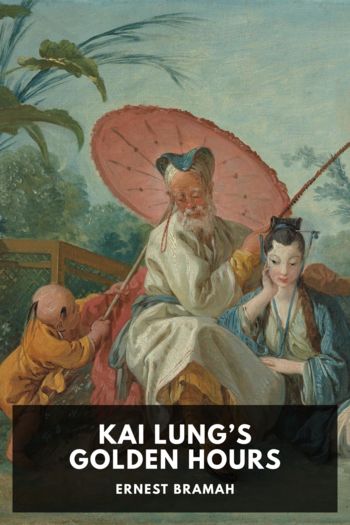Kai Lung’s Golden Hours - Ernest Bramah (the reading strategies book .TXT) 📗

- Author: Ernest Bramah
Book online «Kai Lung’s Golden Hours - Ernest Bramah (the reading strategies book .TXT) 📗». Author Ernest Bramah
Thus denied, Lao Ting sought other means to continue his study, if for only a few minutes longer daily, and it became his custom to leave his ill-equipped room when it grew dusk and to walk into the outer ways, always with his face towards the west, so that he might prolong the benefit of the great luminary to the last possible moment. When the time of no-light definitely arrived he would climb up into one of the high places to await the first beam of the great sky-lantern, and also in the reasonable belief that the nearer he got to it the more powerful would be its light.
It was upon such an occasion that Lao Ting first became aware of the entrancing presence of Chun Hoa-mi, and although he plainly recognized from the outset that the graceful determination with which she led a water-buffalo across the landscape by means of a slender cord attached to its nose was not conducive to his taking a high place in the competitions, he soon found that he was unable to withdraw himself from frequenting the spot at the same hour on each succeeding day. Presently, however, he decided that his previous misgiving was inaccurate, as her existence inspired him with an all-conquering determination to outdistance every other candidate in so marked a manner that his name would at once become famous throughout the province, to attain high office without delay, to lead a victorious army against the encroaching barbarian foe and thus to save the Empire in a moment of emergency, to acquire vast riches (in a not clearly defined manner), to become the intimate counsellor of the grateful Emperor, and finally to receive posthumous honours of unique distinction, the harmonious personality of Hoa-mi being inextricably entwined among these achievements.
At other times, however, he became subject to a funereal conviction that he would fail discreditably in the examinations to an accompaniment of the ridicule and contempt of all who knew him, that he would never succeed in acquiring sufficient brass cash to ensure a meagre sustenance even for himself, and that he would probably end his lower existence by ignominious decapitation, so that his pale and hungry ghost would be unable to find its way from place to place and be compelled to remain on the same spot through all eternity. Yet so quickly did these two widely diverging vistas alternate in Lao Ting’s mind that on many occasions he was under the influence of both presentiments at the same time.
It will thus be seen that Lao Ting was becoming involved in emotions of a many-sided hue, by which his whole future would inevitably be affected, when an event took place which greatly tended to restore his tranquillity of mind. He was, at the usual hour, lurking unseen on the path of Hoa-mi’s approach when the water-buffalo, with the perversity of its kind, suddenly withdrew itself from the amiable control of its attendant’s restraining hand and precipitated its resistless footsteps towards the long grass in which Lao Ting lay concealed. Recognizing that a decisive moment in the maiden’s esteem lay before him, the latter, in spite of an incapable doubt as to the habits and manner of behaviour of creatures of this part, set out resolutely to subdue it. … At a later period, by clinging tenaciously to its tail, he undoubtedly impeded its progress, and thereby enabled Hoa-mi to greet him as one who had a claim upon her gratitude.
“The person who has performed this slight service is Ting, of the outcast line of Lao,” said the student with an admiring bow in spite of a benumbing pain that involved all his lower attributes. “Having as yet achieved nothing, the world lies before him.”
“She who speaks is Hoa-mi, her father’s house being Chun,” replied the maiden agreeably. “In addition to the erratic but now repentant animal that has thus, as it were, brought us within the same narrow compass, he possesses a wooden plough, two wheelbarrows, a red bow with threescore arrows, and a rice-field, and is therefore a person of some consequence.”
“True,” agreed Lao Ting, “though perhaps the dignity is less imposing than might be imagined in the eye of one who, by means of successive examinations, may ultimately become the Right hand of the Emperor.”
“Is the contingency an impending one?” inquired Hoa-mi, with polite interest.
“So far,” admitted Lao Ting, “it is more in the nature of a vision. There are, of necessity, many trials, and few can reach the ultimate end. Yet even the Yangtze-kiang has a source.”
“Of your unswerving tenacity this person has already been witness,” said the maiden, with a glance of refined encouragement.
“Your words are more inspiring than the example of the aged woman of Shang-li to the student Tsung,” declared Lao Ting gratefully. “Unless the Omens are asleep they should tend to the same auspicious end.”
“The exact instance of the moment escapes my recollection.” Probably Hoa-mi was by no means willing that one of studious mind should associate her exclusively with water-buffaloes. “Is it related in the Classics?”
“Possibly, though in which actual masterpiece just now evades my grasp. The youth referred to was on the point of abandoning a literary career, appalled at the magnitude of the task before him, when he encountered an aged woman who was employed in laboriously rubbing away the surface of an iron crowbar on a block of stone. To his inquiry she cheerfully replied: ‘The one who is thus engaged required a needle to complete a task.





Comments (0)